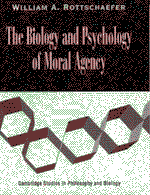Book contents
- Frontmatter
- Contents
- Preface
- Introduction
- PART I MORAL AGENCY AND SCIENTIFIC NATURALISM
- PART II THE BIOLOGICAL BASES OF MORAL AGENCY
- 2 Evolution and morality: Can evolution endow us with moral capacities?
- 3 Evolution and moral agency: Does evolution endow us with moral capacities?
- 4 Developmentally based moral capacities: How does the moral sense develop?
- PART III THE PSYCHOLOGICAL BASES OF MORAL AGENCY
- PART IV A SCIENTIFIC NATURALISTIC ACCOUNT OF MORAL AGENCY
- PART V INTEGRATING A PERSONALISTIC AND NATURALISTIC VIEW OF MORAL AGENCY
- References
- Index
3 - Evolution and moral agency: Does evolution endow us with moral capacities?
Published online by Cambridge University Press: 19 September 2009
- Frontmatter
- Contents
- Preface
- Introduction
- PART I MORAL AGENCY AND SCIENTIFIC NATURALISM
- PART II THE BIOLOGICAL BASES OF MORAL AGENCY
- 2 Evolution and morality: Can evolution endow us with moral capacities?
- 3 Evolution and moral agency: Does evolution endow us with moral capacities?
- 4 Developmentally based moral capacities: How does the moral sense develop?
- PART III THE PSYCHOLOGICAL BASES OF MORAL AGENCY
- PART IV A SCIENTIFIC NATURALISTIC ACCOUNT OF MORAL AGENCY
- PART V INTEGRATING A PERSONALISTIC AND NATURALISTIC VIEW OF MORAL AGENCY
- References
- Index
Summary
Do we actually have evolutionarily based moral capacities? Three prominent contemporary biologists, among others, have addressed that question in some detail and given it significantly different answers. Although all three have taken broadly interactionist stances, after that they part ways. George C. Williams (1988a,b, 1989) has adopted an antagonistic interactionist stance, arguing that biology and morality are in mortal combat with each other. For Williams, the ends of evolutionary processes, whether the ultimate ones of survival and reproduction or the proximate ones of various adaptations, are morally tainted and conflict with morality. Richard Alexander (1979, 1985, 1987) puts morality in the service of biology, viewing evolutionary ends as morally neutral. E. O. Wilson (1978) places biology in the service of morality, and argues that they provide the bases for morality. I shall examine both Wilson's proposal and the support that he brings for it and argue that Wilson's evolutionary story about morality cannot be the full story. Although the support that he offers for the existence of evolutionarily based moral capacities is suggestive, much more evidence is needed to make his plausible suggestion into a well-supported hypothesis. In the following chapter, I attempt both to expand Wilson's evolutionary story and to argue for an integrationist approach by shifting our focus to development and the ontogeny of moral capacities.
- Type
- Chapter
- Information
- The Biology and Psychology of Moral Agency , pp. 52 - 73Publisher: Cambridge University PressPrint publication year: 1997



